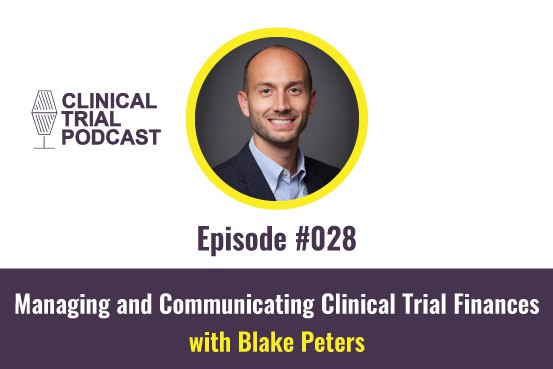Clinical trial finance is a key area of clinical trials and clinical research.
Human beings are innately not good with numbers and clinical trial finance is no exception.
Creating study budgets, forecasting clinical trial costs, and managing trial finances are essential skills for any clinical research professional.
This is true for sites, vendors, CROs, and Sponsor personnel, irrespective of whether they have direct responsibility for clinical trial finances.
In this episode, I had the opportunity to speak with my friend Blake Peters who is exceptional at what he does with clinical trial finances.
Blake is currently an Associate Director, Clinical Research at Abbot Labs.
I’m excited to bring Blake on the show given his extensive experience managing multi-million dollar clinical trial budgets.
We had an excellent conversation on a variety of topics such as careers, being resourceful, clinical trial finance, storytelling and presentation skills, and much more.
I hope you enjoy this interview with Blake.
Blake Peters on LinkedIn.
Show Notes:
[03:05] How does one make a transition into clinical research?
[05:50] Core skills
- Bringing value to your team
- Helping clinical project managers forecast and estimate clinical trial costs
- Excel skills
- Data analytics
- Financial mindset
- Continued curiosity to learn and grow
[07:38] Transitioning from finance to clinical research
- Learning about the conduct of clinical trials
- Therapeutic knowledge
- On the job training
- A clinical research training conference
[10:40] Working with clinical project manager on finances
- Challenging clinical trial assumptions to optimize financing
- Historic data on benchmarking
[16:55] Hospitals are required to publish procedure costs
[18:15] Collaboration with finance on clinical trials and research
- Alignment on vocabulary, a common understanding of what each if try to talk about
[21:18] Maslow’s Law of Hierarchy for Clinical Trial Costs
- Cost of the clinical trial – a list of expense type
- Cost driver – how to multiply the expense, scales with sites and/or patients or fixed expenses
- Timing of these expenses
- Factors that change the cost
- Total trial cost
[27:00] Clinical Research Organization (CRO) budget – ensuring you are not overspending when you decide to outsource
- Review project management fees
- Review monitoring costs
- Categorize costs into buckets or functional costs (safety, data management, operations, etc.)
[31:25] Becoming proficient in Microsoft Excel
- What do you find yourself doing manually and/or repeatedly?
- Be resourceful
- Spending 5-10 minutes can save you tens or hundreds of hours
- Research solutions (Youtube, Google) and implement
[38:55] Powerpoint skills in clinical research
- Understanding the message
- Meeting with the stakeholders
- Think about table vs. graphs vs. graphics
- Don’t overdo animations
- First, get the content on the slide and then focus on the aesthetics of your slides
- Iterate, hit save and look at it again the next morning
[46:00] Types of PowerPoint slides
- Speak for itself with clean design
- Reference manual
- Different audience/ use cases
[46:40] Slides are an outward representation of the person who built them. They serve as an opportunity to show your creativity and can open doors for you
[48:00] Valuable skills for clinical research professionals
- Listening
- Public speaking/ storytelling
[51:00] Passion and inspiration
[53:20] Managing stress with diet, meditation, drinking a lot of water
Resources(s) mentioned:
Book(s) mentioned:
What Got You Here Won’t Get You There: How Successful People Become Even More Successful by Marshall Goldsmith







